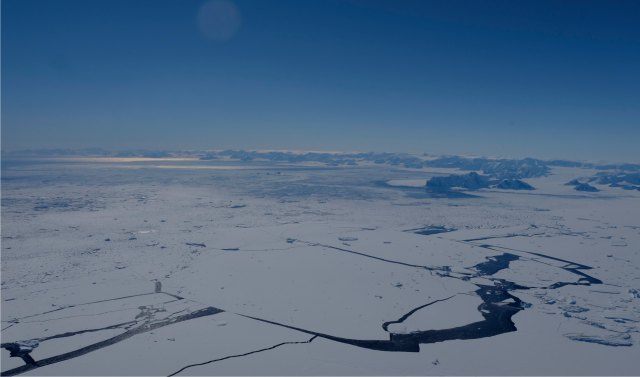When I first got offered the opportunity to work in Antarctica, I imagined it to be pretty adventurous – braving the elements with limited resources, a handful of people surviving on dry biscuits and vitamin pills at an outpost of humanity – that kind of thing. While this might be true for some of the jobs that are based in the field – life at Rothera is pretty cushiony and brimming with people (during summer that is). Not only is the station packed with amenities such as TV-rooms, a music room, a gym, a lounge, a bar, a bouldering wall but we are also being catered for 3 times a day by some excellent chefs. In this kind of environment it is very easy to forget a little bit where you are and get bogged down with work while neglecting to look around and appreciate the incredible place you are in. One way to remind oneself how remote and isolated Antarctica really is and get a new sense of its stark beauty, seems to be to fly across it. Rothera is the central supply hub for field sites. When the summer season is in full swing the charismatic red twin otter (or twotters) planes are constantly coming and going – bringing fuel, food, people and science equipment to Sky-Blue and Fossil Bluff (the BAS maintained field sites further down the Peninsula) or to even more remote locations deeper into the continent. Each flight needs a co-pilot and these are generally people working at the station. For divers this isn’t quite so easy as we have a 48 hour embargo on flying after every dive, so when I did have the chance to be a co-pilot for a fuel run to Alexander Island (Lat. 71°19’59″S, Long. 68°16’40″W) I jumped at it – more or less literally.

A flying day starts off with a meteorology brief, at the uncivilised hour of 7.45 (yes, it is a tough life out here). The brief mostly includes a weather forecast and although the presenter has the typical pleasant aptitude and voice of the weather person at your local news station the similarities stop there and I generally have very little idea whether whatever he just said means there is good or bad weather. Fortunately the pilots do and make a decision on their flights based on this forecast. Once you’ve been given the green light you need to scramble all your essential kit together (peppermint tea and avocado sandwich – after all we are still civilised down here) and head over to the hangar for a quick induction before climbing up into the lofty cockpit – pilots seemed to have found an elegant way of doing this; I, on the other hand, am very much going with the seal approach of throwing myself at it and then pulling the rest up. My pilot for the day was Vickie, who not only is a brilliant and experienced pilot but has a tremendously inspiring life story of starting her career as a meteorologist before discovering her love for flying and deciding to become a pilot for BAS. After settling down in the cockpit and all necessary pre-departure checks, it didn’t take long until we were on the runway and taking off.
Having arrived by ship, this was the first time I saw Rothera and especially the Antarctic Peninsula from the air. It’s only a short 1.5 hour flight from Rothera to Fossil Bluff, but it is one of the most stunning routes heading South along the mountain ranges of the Antarctic Peninsula. It is a supremely surreal feeling to fly across white planes barren of any kind of human impact, the snow completely untouched; across the frozen sound that no ship ever sailed on, along mountains formed by thousands of years of glaciation. The planes have skies fitted to them so that we can land and start on snow, which is exactly what we did. We only spent a few minutes at Fossil Bluff to drop off full fuel drums and pick up empty ones.

Seeing as this was my first time there I was released from helping out and encouraged to do the tourist thing – mainly running around the plane and taking pictures. On the return journey the sea ice was breaking up in ever smaller perfectly rectangular squares the further north we got. The whole journey only took half a day – yet was a perfect reminder that even though life on base is perfectly comfortable, we live at an extremely remote and secluded place few people have seen before and a very far away from civilisation.




Amazing! You are doing *such* exciting things! I am very glad you still have avocado sandwiches, though 🙂
LikeLike
May I simply just say what a relief to uncover an individual who truly knows what they’re discussing
on the net. You definitely know how to bring an issue to light and make it important.
More and more people have to check this out and understand this side of the
story. I can’t believe you are not more popular since you surely have the gift.
LikeLike